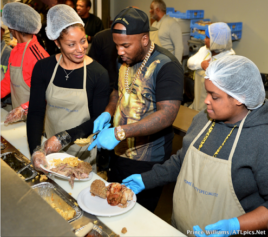
Oprah Winfrey and other Black celebrities have faced criticism from some African-Americans for their support of philanthropic causes in Africa. Critics argue these celebrities should focus their giving on African-Americans. Others suggest Black people take a collective approach to philanthropy that incorporates Africa, the diaspora and the United States. (Photo: Pinterest).
Some African-American celebrities have made their presence known beyond entertainment and sports and have engaged in philanthropy, sharing their fortunes, and giving of their time and resources to help those who are less fortunate and in need. These Black celebrities have faced criticism from within the Black community for their charitable activities — specifically, for giving to charity in Africa and elsewhere in the diaspora rather than to Black people in America. Why does the Black community feel as if there is a difference, and how can it overcome that mindset?
Recently, Beyoncé and Gucci joined forces to provide drinking water to 100,000 women and children in Burundi, a country where access to clean water for bathing and drinking is a challenge. BeyGOOD, the recording artist’s organization, Gucci, Chime for Change, and UNICEF donated $85 million to build 80 wells in the African nation.
Similarly, Don Cheadle created the nonprofit Ante Up for Africa to bring humanitarian aid to Africa, and John Legend’s Show Me campaign lifts Africans out of poverty. Lil Jon opened an elementary school in Ghana, and Oprah Winfrey opened a school for girls in South Africa, for which she received criticism and responded appropriately:
@Oprah when are u going 2 give back 2 the ghettos in america?
— Admiral (@awalkdatalk) July 30, 2012
@awalkdatalk when are u? I’ve put 500 African American men thru college . And u sir?
— Oprah Winfrey (@Oprah) July 30, 2012
Philanthropy is by no means a new phenomenon for the African-American community, nor is it limited to the wealthy. Black philanthropy in the U.S. is rooted in the days of slavery and the need for “self-help” and Black people helping each other not for financial gain but out of a sense of justice and survival. From the Underground Railroad and the Masons —who provided mutual aid to Black people beginning in 1775 in Boston — to the Free African Society — formed in Philadelphia in 1785 to aid orphans and the sick — to the Black church, burial societies, civil rights organizations and other fraternal and social welfare institutions in the Black community, the history of Black philanthropy is long and it runs deep.
According to the W.K. Kellogg Foundation, African-Americans donate 25 percent more of their income to charitable causes than do white Americans. Other studies have found Black people are nearly twice as likely as whites to have a family tradition of giving, to believe that large gifts can make a difference in society or the world, and to plan to increase their charitable giving in the future.
Three-quarters of individual gifts to the new Smithsonian National Museum of African American History and Culture came from Black donors, with $4 million coming in gifts of less than $1,000. Oprah Winfrey contributed $20 million to the museum.
Dr. Jackie Copeland-Carson, founder of Black Philanthropy Month and the Pan-African Women’s Philanthropy Network, has noted that Black American and diaspora philanthropy are adaptations of African collective giving practices passed through slavery and subsequent Black immigration. Black giving in the U.S. always has been global, with influences from Africa, the Caribbean, Latin America, Asia and Europe. The reasons why some Black Americans object to Black celebrities helping Africa are multiple and complex, according to Dr. Copeland-Carson.
“For many African-Americans who define as Black, Black only includes those whose ancestors came through the transatlantic slave trade,” Copeland-Carson told Atlanta Black Star, noting what is “understandably a U.S.-centric, ethnic-specific” meaning for African Americans. “Despite the Black Is Beautiful movement, and Wakanda, I think that many people have been socialized to define blackness exclusively in African-American terms. And we don’t often think about it. It’s more of a knee-jerk reaction, a social history that reflects their reality,” she added.
Pan-Africanism is a part of Black history, one which continues today in the global economy in which we live, Dr. Copeland-Carson said. “Celebrities have a network that is local. Their mothers and ancestors were brought here. But they’ve traveled and have a broader, more international cultural lens. And once you travel and are exposed to Black culture overseas you see many cultural similarities,” she said. “Celebrities don’t have an either-or perspective, and they feel they can support Black people everywhere, because black people suffer everywhere from slavery and colonialism,” Copeland-Carson added on the value of travel, suggesting many African-Americans are not taught a global perspective, and as a result are unable to keeping pace with the global economy.
Another reason for African-American opposition to a philanthropic focus on Africa is that our community is suffering and in a state of emergency, Dr. Copeland-Carson believes. However, she points out the commonalities Black people share in our global society. “When you look at the social demographics and statistics — Brazil, South America, Central America and the United States, we tend to look similar in terms of educational opportunity and health care. We tend to have the highest maternal and infant deaths in the world,” she added, noting many philanthropists are focused on a broad concern for social justice and a common destiny, and have a global portfolio where they can give to both African-American and African causes. Dr. Copeland-Carson focuses on bringing people together on shared challenges. She notes that of the $23 billion that Black people in America give to charity each year, half is from African immigrants. “What can we do together is to deal with these persistent disparities that tend to plague Black people, no matter where they have been born, no matter where they are living.”
All ethnic groups have a perspective of giving to their own culturally specific group on the one hand, and giving to the motherland on the other, Copeland-Carson says, arguing Black people must become more strategic. “I believe until Black people have a more global perspective on their identity, and pool resources and social action to address these issues …we will perpetuate these cycles of despair,” she said.
Her recommendations are that people should get involved in Black Philanthropy Month — which is August — and get involved in the community to build social relationships. “You don’t have to [go to] Africa to meet Africans. We tend to have all of these barriers,” she argued, “We would be better off if we learned to work around the ethnic diversity rather than be mired in conflict,” she said, offering that Black people should link arms despite their internal differences, like Latin and Asian-American communities. Bridge building allows us to better understand the common challenges among Black immigrants and Black Americans. “Black immigrants have stereotypes about Black Americans and have to educate each other on experiences,” she said, also suggesting that people travel, read, get involved in philanthropic visits to African countries and study tours through organizations such as African Ancestry, and find organizations that make a difference.
Where Black people are concerned, experiences are shared wherever they are, whether in Africa, America or across the diaspora. And philanthropy need not be a matter of “either-or” but rather a collective effort to bring everyone up.

